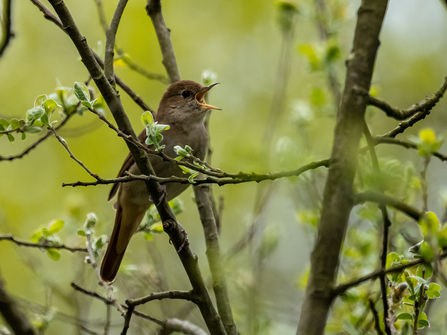Fingringhoe Wick Nature Discovery Park in Colchester is home to 1% of the UK’s population of nightingales, making it a stronghold for this vulnerable and declining species. Nightingales are estimated to have declined by 90% in the last 50 years, caused by climate change, predation and loss of habitat.
Nightingales return to Fingringhoe Wick

Richard Chew
Essex Wildlife Trust’s nature reserve provides a nesting, feeding and breeding habitat to support the species. The reserve is an important habitat for them, as nightingales nest in thick, dense scrubs at ground level, feeding on insects.
Nightingales have a rich vocal repertoire, able to produce over 1,000 different sounds, compared to just 340 by skylarks and blackbirds producing an estimated 100. The part of the brain responsible for creating sounds is bigger than in most other birds. Singing through the day and night, male birds will attempt to serenade a female mate.
Essex Wildlife Trust has recently noted the first nightingales returning to the site and invite the public to come and hear these rare, migratory, songbirds before they return to West Africa in the late summer. The best time to hear them is throughout their breeding season, in late April and May.
Fingringhoe Wick Nature Discovery Park will be open for a series of ranger-led guided walks and free self-guided late-night dates throughout the nightingale breeding season.
For bookings and enquiries, please visit the Trust’s event page or contact the reserve via telephone: 01206 729678
Lauren Cosson, Communications Officer at Essex Wildlife Trust says: “Fingringhoe Wick is one of the best places in the country to hear nightingales. With an array of trills, whistles, gurgles and crescendos, you will not want to miss listening to these amazing birds. We are incredibly lucky to have nightingales returning to us each year, and encourage the public to come and hear this unmissable wildlife spectacle.”
